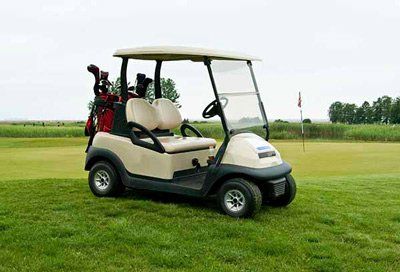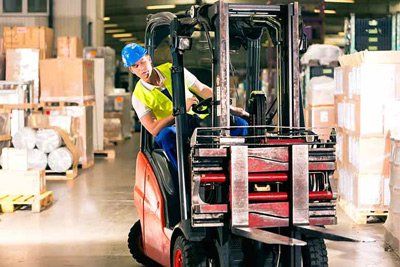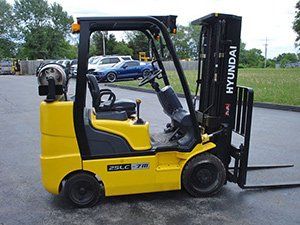
Although forklifts are somewhat smaller pieces of machinery and operate off the ground, they weigh several tons and go faster than you think that they would. As a result, they can be extremely dangerous. In fact, according to the Washington State Department of Labor & Industries, every year in the United States, roughly 35,000 and 62,000 serious and nonserious forklift-related injuries occur, respectively.
People don't just get injured in relation to forklifts, as deaths can also be involved. Statistics reported by the National Association of Wholesaler-Distributors show that roughly 100 people lose their lives in forklift-related incidents every year here in the United States.
More often than not, the reason for these injuries and deaths can all come back to the lack of proper safety protocol being used when the forklift was in operation. With that being said, it is crucial that you play it safe with forklifts.
As a business owner, you need to ensure that your staff is trained properly and that Occupational Safety and Health Administration regulations are followed. As a forklift operator, you need to follow protocol that you learned during training and certification. Here are some tips for the safe handling of forklifts.
1: Only Allow Qualified Individuals to Operate Forklifts
The individual that is operating a forklift must have undergone official training and have received their official certification. If they have not, then they cannot legally operate the forklift. This is because the individuals going through the training will not only go through lectures and written evaluations but also experience practical and hands-on training so that they know what to expect in a real-life situation.
Certified forklift operators will know how to operate a forklift around obstacles and hazards that may crop up in a moment's notice as well as general hazards, including surface and lighting conditions. In addition, a qualified operator will understand the factors that could impact the stability of the equipment.
These are all things that an unqualified individual would not be familiar with, which could lead to a disastrous situation. For example, an uncertified operator could drive a forklift with an unbalanced load on a sloping surface, which would put the forklift at risk of tipping over.
2: Do Not Leave an Operating Forklift Unattended
If you are using a forklift, it should never be left unattended. In fact, it is illegal to leave the forklift running or leave the keys in a forklift unattended. This is a safety hazard that can come with serious consequences.
3: Avoid Hazards
When operating a forklift, it is imperative that you avoid hazards at all costs. You will want to make sure that you avoid any uneven ground, bumps and slippery conditions, in addition to loose objects on the ground, as all of these could result in you losing control of the forklift. When you are coming up to an entrance or a corner, make sure to use your horn to alert others of your location to avoid unnecessary collisions.
Always drive at an acceptable speed so that you are able to stop quickly and safely when necessary. Also, don't follow too closely to other forklifts or equipment, as you never know when they may move unpredictably.
As long as everyone follows proper safety protocol for the operation of forklifts, you can significantly reduce the risk of injury and death in the workplace. If your facility is in need of new forklifts, or your existing forklifts are in need of parts or service, contact RDS Equipment, Inc., to discuss your needs. We have a line of Hyundai forklifts
that may be right up your alley!










